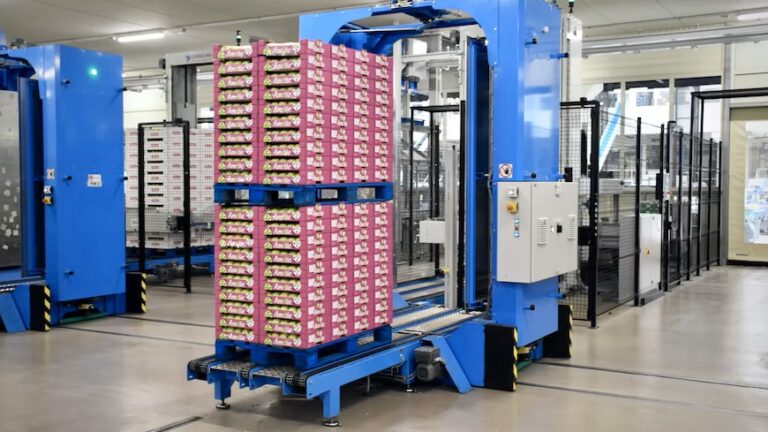Imagine opening a new gadget only to find rusty components. It’s frustrating, right? For a business, this could amount to colossal losses both financially and in terms of consumer base.
Protective anti-corrosion packaging steps in to solve this issue by efficiently safeguarding your product during storage and transportation. It ensures pristine condition upon arrival – contributing to both customer satisfaction and product longevity.
This comprehensive guide highlights what you need to know about protective anti-corrosion packaging.
Understanding Protective Anti-Corrosion Packaging
Protective anti-corrosion packaging, often found in products like electronics or machinery, plays a critical role in preventing rust, corrosion, or moisture damage. This specialized packaging is infused with compounds that interrupt the electrochemical process causing corrosion.
Some of their uses in different industries include:
- Automotive Industry – Safeguarding car parts and components
- Electronics Industry – Protecting electronic devices from humidity damage
- Pharmaceutical Business – Preventing pill and capsule deterioration
- Food Sector – Maintaining canned or boxed food freshness
- Industrial Equipment Manufacturing – Preserving the quality of heavy machinery parts
- Warehouse Storage Services – Prolonging shelf-life of stored items
Types of Protective Anti-Corrosion Packaging
Protective anti-corrosion packaging comes in diverse forms. Each variant is engineered to combat rust uniquely, targeting specific industries and applications. The most common types include the following:
1. VCI Film
Volatile Corrosion Inhibitor (VCI) film is a popular solution offering effective protection against humidity-induced damage. It works by releasing chemical compounds that form a thin, invisible layer on the metal surface it covers. Common uses include packaging for automotive parts, metals, and military equipment.
2. VCI Foam
VCI foam, designed with corrosion-inhibiting technology, emits protective compounds that consistently prevent corrosion in enclosed packages. With a wide range of applications, VCI foam is well-suited for intricate electronic devices and delicate machine parts that demand thorough protection during transit. Unlike VCI film, VCI foam also protects against physical damage.
3. Protective Coatings
In the world of anti-corrosion packaging, protective coatings are a bit unique. They form a physical barrier on surfaces, warding off rust without releasing compounds into the environment. Many varieties exist, from epoxy and polyurethane to the eco-friendly water based rust inhibitor variants.
Each offers distinct advantages: epoxies are resistant to chemicals and wear, polyurethanes are robust against abrasion, whereas water based inhibitors deflect moisture effectively.
These coatings defend against harsh conditions and find broad use in heavy industries, manufacturing sectors, and even home maintenance projects. A well-chosen blend of these can extend your product’s lifespan significantly.
In various industries, achieving a durable and consistent protective barrier can be accomplished through specialized coatings. For instance, in sectors requiring precise insulation from harsh conditions, understanding the parylene coating process could be beneficial. This unique coating method offers a comprehensive solution for safeguarding sensitive materials, extending their lifespan under various environmental influences. By learning about the deposition process and reviewing its advantages such as increased reliability and enhanced performance of electronics, businesses can make informed decisions when choosing protective measures.
4. Anti-Corrosion Paper
Anti-corrosion paper also integrates VCI technology. This type of packaging releases anti-rust chemicals when exposed to air – hence offering an active layer of protection during storage or transit. Typically, you’ll find this paper used in products with delicate metal parts like hardware tools.
5. Desiccant Packaging
A different player in anti-corrosive packaging is desiccant packaging. These packages contain moisture-absorbing substances, known as desiccants, which keep the inside dry and corrosion-free.
It is an ideal choice for electronics, food items, and pharmaceuticals that require low-humidity environments for optimal preservation.
6. Rust Preventive Oils
Last but certainly not least are the rust preventive oils. These substances form a robust film over the metal surfaces they’re applied to, thereby insulating them from moisture and air — two common triggers of rust and corrosion.
Predominantly used in heavy machinery and automotive industries, these oils serve as an ideal intervener for long-term storage concerns.
Tips for Choosing Protective Anti-Corrosion Packaging
When selecting the right anti-corrosion solution for your products or business, here’s a list of tips and practical aspects to consider so you make an informed decision.
Understand Your Needs
First off, diagnose the specific corrosion issues you’re confronting. What type of metal or product needs protection? Is there potential exposure to special conditions like high humidity or salinity?
Assess the Scalability
Consider how well your chosen solution can adapt to your production scale. Large business owners might prefer bulk packaging options while smaller enterprises could lean towards custom-sized solutions.
Evaluate Effectiveness and Duration
Study how long each packaging type can provide protection. Some might work best for short-term storage, while others are better suited for long-term preservation.
Think about Environment Friendliness
As the benefits of implementing sustainable packaging grow, opt for eco-friendly options such as water based rust inhibitors and desiccant packaging which are effective without harming the environment.
Factor in Cost Efficiency
Lastly, focus on cost-effectiveness. Remember that an expensive setup isn’t necessarily superior. Balance budget and efficiency to select a solution that delivers strong performance without breaking the bank.
When it comes to facilitating product longevity, protective anti-corrosion packaging is a game-changer. As each industry has its unique requirements, understanding and selecting the appropriate solution is key to enduring success. The above guide will hopefully make your selection process much easier.





